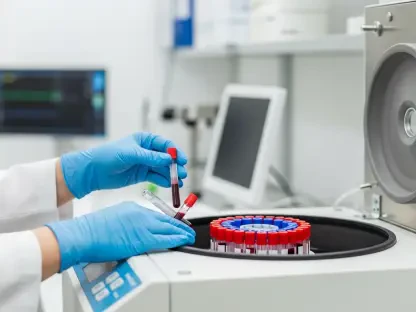In a notable milestone for cancer treatment, Johnson & Johnson’s cutting-edge investigational system, TAR-200, has been accorded priority review status by the FDA. Specifically designed for high-risk non-muscle invasive bladder cancer (NMIBC) patients, this system marks a significant leap forward, especially for patients unresponsive to Bacillus Calmette-Guérin (BCG) therapy with carcinoma in situ, with or without papillary tumors. The driving force behind this expedited review is the compelling results from the phase 2b SunRISe-1 trial. Achieving an 82.4% complete response rate, the findings revealed that 52.9% of patients maintained a year-long cancer-free state after their initial positive response. With the TAR-200 device, patients receive directed gemcitabine delivery straight into the bladder, offering a revolutionary treatment avenue and presenting a gentler alternative to the conventional radical cystectomy. This advancement especially benefits older patients for whom radical surgery might not be feasible.
The Innovative Approach of TAR-200
The technology behind TAR-200 exemplifies the evolution of drug delivery methods in the contemporary medical scene. Incorporating gemcitabine, a chemotherapy agent, into the bladder without major surgical procedures, the TAR-200 system leverages a less invasive delivery method that directly addresses localized cancer cells. This approach is perfectly aligned with Johnson & Johnson’s overarching strategy of pioneering novel cancer therapies that promise both efficacy and patient-centricity. The system’s success underscores the broader paradigm shift towards tailored, targeted cancer treatments that prioritize enhanced patient outcomes while minimizing treatment-induced trauma. As bladder cancer diagnoses escalate, with the American Cancer Society forecasting 84,870 new cases in the United States this year alone, the precision and efficacy of TAR-200 become increasingly pivotal in the urological oncology landscape.
J&J’s Expanding Oncological Portfolio
Johnson & Johnson’s dedication to bladder cancer treatment extends well beyond their TAR-200 innovation. Their robust oncology portfolio is strengthened by Balversa (erdafitinib), which has recently gained ground in the UK for treating specific urothelial cancer patient groups. This progress highlights J&J’s comprehensive approach, addressing various forms of bladder cancer and ensuring treatment accessibility worldwide. Such a strategy mirrors a larger industry trend toward personalized medicine, with treatments tailored to genetic profiles and cancer subtypes. By honing in on targeted therapies and expanding their global reach, Johnson & Johnson is forging a detailed plan for cancer treatment that promises to transform patient care standards. This commitment to developing innovative and effective treatments reveals the company’s foresight and dedication to revolutionizing bladder cancer care for patients worldwide. J&J’s advances not only represent technological progress; they also usher in a new era of treatment hope for those facing bladder cancer, setting a benchmark for the future of personalized medicine.









